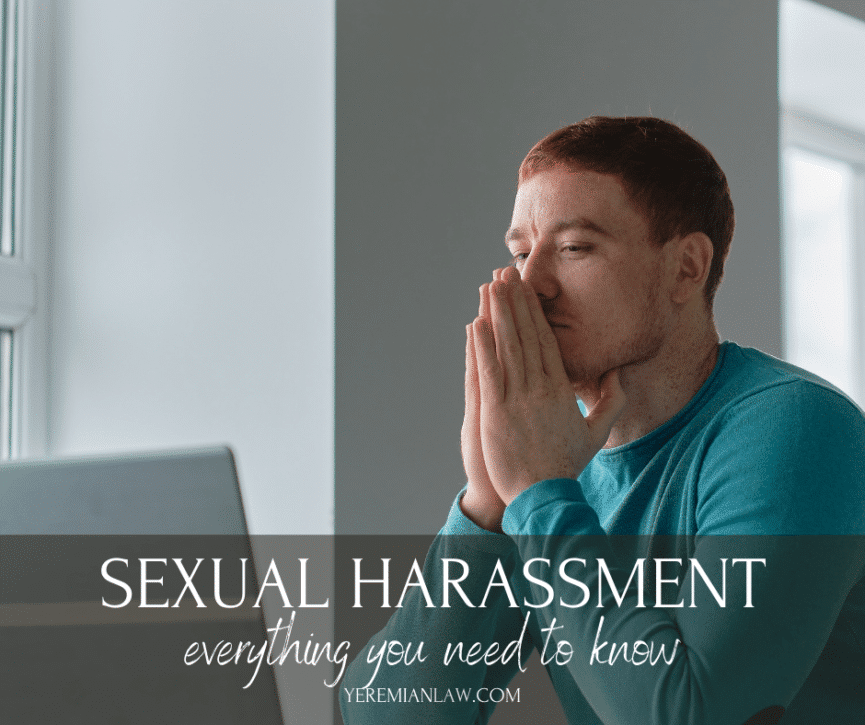If you’re like many people, you know that California law protects you from sexual harassment in the workplace – but how far do those protections go, and who gets into trouble when sexual harassment occurs? Here’s what you need to know.
California Law on Sexual Harassment in the Workplace
In California, sexual harassment in the workplace is unlawful – but unfortunately, it still happens. Sexual harassment may include things like unwelcome sexual advances, requests for sexual favors, or words exchanged of a sexual nature. The law takes it one step farther, as well; harassment doesn’t necessarily have to be of a sexual nature to count as sexual harassment. It can refer to making offensive remarks about a person’s sex. That means it’s illegal to harass a female employee by making offensive remarks about women in general.
Does Sexual Harassment Count if It Comes From Someone of the Same Gender?
Sexual harassment can occur whether the victim or harasser are different sexes or of the same sex. That means women can be guilty of sexually harassing other women and men can be guilty of sexually harassing other men.
Examples of Sexual Harassment in California
Check out these examples of sexual harassment that occur in California workplaces too often:
- Derogatory comments, slurs or jokes
- Unwanted touching (like backrubs, brushes against another person disguised as accidental contact, or pats on the backside)
- An offer of employment or another type of benefit in exchange for sexual favors
- Threats to reduce hours, benefits, pay rate or other conditions of employment unless you comply with a sexual request
- Actual loss of employment or benefits after a person makes a harassment complaint
- Unwanted sexual propositions
- Discussion of sexual acts
- Display of sexually suggestive objects, pictures or cartoons, or when someone gives one of these objects to another person
- Graphic comments
- Sexually degrading words
- Sexually suggestive or obscene messages or invitations
- One person blocking another person’s movements
What Should You Do if You’re Being Sexually Harassed at Work?
If you’re being sexually harassed at work, you do not have to tolerate it. It is absolutely okay to stand up for yourself and let the other person – even if it’s your boss or supervisor, or someone even higher than your supervisor – know that their conduct is inappropriate.
You need to know that sexual harassment is prohibited under Title VII of the Civil Rights Act of 1964. It’s also prohibited under the California Fair Employment and Housing Act, or FEHA. Under both of these laws, sexual harassment is a form of discrimination in employment.
The Two Types of Sexual Harassment
There are two main types of sexual harassment: quid pro quo and hostile work environment.
Related: 5 fast facts about sexual harassment
Quid Pro Quo Sexual Harassment
Quid pro quo sexual harassment involves one person promising to exchange an employment benefit for a sexual favor. This type of harassment may feel like an offer (“I’ll give you a raise if you sleep with me”) or like a threat (“If you don’t sleep with me, you’re not getting a raise”). Either way, it’s against the law.
Related: Quid pro quo harassment examples
Hostile Work Environment Sexual Harassment
Hostile work environment sexual harassment occurs when the offending behavior is so pervasive or severe that it unreasonably interferes with your work, alters the conditions of your employment, or creates an environment that a reasonable person would consider intimidating, hostile or offensive.
Related: What is a hostile work environment?
What if the Sexual Harassment Isn’t Aimed at You?
You can experience and suffer from sexual harassment even if the behavior isn’t aimed at you. It’s still unlawful – and the law doesn’t say that you must be the victim in order to suffer from it.
Emotional Distress and Sexual Harassment
The key with sexual harassment is that a reasonable person would find the conduct offensive, hostile or abusive, and that the conduct caused the victim some type of emotional distress.
Do You Need to Talk to a Lawyer About Sexual Harassment?
If you have been sexually harassed in the workplace, we may be able to help you. Call our office at 818-230-8380 now to schedule your free consultation with an experienced employment lawyer serving Los Angeles and Glendale. If it’s easier, fill out the form below and we’ll get back to you as soon as we can.




